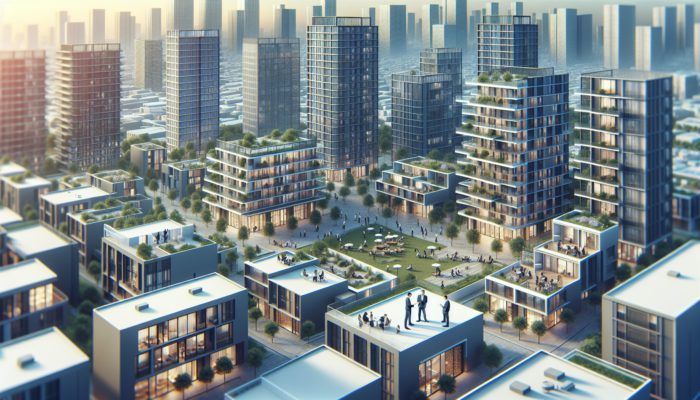Unveiling the Dynamic Mid-Level Property Market Scenario in Mahikeng
Comprehensive Analysis of Property Types and Their Distinct Market Appeal

The mid-level property market in Mahikeng is characterised by a diverse selection of property types, including semi-detached houses, townhouses, and flats. Each category is designed to cater to specific buyer demographics, influenced by factors such as affordability, family size, and lifestyle preferences. Semi-detached homes are particularly appealing to families, thanks to their spacious gardens and larger living areas, making them suitable for those with children and pets. In contrast, young professionals and couples are often attracted to townhouses, which offer modern designs and require less maintenance. Affordable flats, strategically situated in desirable locations, present excellent opportunities for first-time buyers and investors seeking lucrative rental yields.
By grasping the popularity of various property types, potential buyers can make well-informed decisions that align with their needs. Properties located in areas rich with amenities, especially those near schools, tend to see heightened demand, particularly among families seeking semi-detached homes. Likewise, townhouses and flats that are conveniently positioned near transport links are often more coveted. Local economic conditions and demographic trends play a crucial role in shaping these preferences, underscoring the importance for buyers to remain informed about the shifting dynamics of Mahikeng’s property landscape.
In-Depth Evaluation of Average Price Trends in Mahikeng Over the Last Five Years
In the past five years, the average price of mid-level properties in Mahikeng has exhibited significant fluctuations due to a variety of market influences. Initially, the market experienced a steady rise, with prices increasing as demand outstripped supply, particularly during 2018 and 2019 when buyers actively sought properties that offered substantial value in this flourishing city.
However, the emergence of the COVID-19 pandemic in 2020 marked a pivotal change, leading to a shift in market dynamics and a temporary decline in property prices. The economic uncertainty prompted many prospective buyers to adopt a more cautious approach, resulting in an oversupply of listings. As recovery commenced in 2021 and 2022, there was a resurgence of interest from buyers, particularly in affordable properties, as individuals sought to secure stable housing conditions in the post-pandemic landscape. Currently, prices appear to be stabilising, suggesting a more balanced market, which is critical for potential investors to assess as they evaluate their opportunities.
Exploring Demand and Supply Dynamics in Mahikeng’s Property Market
The demand and supply dynamics within Mahikeng’s mid-level property market are fundamental in determining pricing and availability. An increasing population, coupled with a surge of young professionals pursuing job opportunities, has resulted in heightened demand for mid-level housing. This demand often conflicts with a limited supply of suitable homes, particularly in well-established neighbourhoods that provide essential amenities.
Looking forward, forecasts indicate that as local infrastructure improves and new residential developments emerge, the availability of mid-level properties will likely increase, alleviating some of the current market pressures. Investors should remain attentive to shifts in both demand trends and supply developments to spot optimal investment opportunities. A sound understanding of these dynamics will empower buyers to make informed and strategically sound decisions in this ever-evolving marketplace.
Gaining Valuable Insights into Trends in Mahikeng’s Mid-Level Property Market

Identifying Key Factors That Influence Property Values in Mahikeng
Several key factors significantly impact the value of mid-level properties in Mahikeng, making it essential for buyers to comprehend these elements. The property’s location stands out as the most crucial determinant; areas in proximity to schools, shopping centres, and healthcare facilities typically command higher prices. Furthermore, the condition and age of the property are vital factors, as well-maintained homes generally attract a premium price. Market conditions—including buyer sentiment and economic indicators—also play a pivotal role, directly influencing property prices.
- Location and proximity to amenities
- Condition and age of the property
- Market conditions and economic indicators
- Local infrastructure developments
- Neighbourhood trends and demographics
- Government policies and incentives
- Interest rates and financing availability
- Rental demand and yield potential
Understanding these factors equips potential investors with the necessary knowledge to make informed decisions. For instance, recognising the importance of nearby amenities may lead buyers to focus on properties located in desirable areas, ultimately enhancing their investment outcomes. Additionally, being aware of local developments can uncover opportunities for future appreciation in property values.
Strategies for Investors to Anticipate Future Market Movements
Anticipating future movements within the mid-level property sector in Mahikeng heavily relies on a comprehensive understanding of current trends and economic indicators. By analysing historical data and monitoring local developments, investors can make educated forecasts regarding the market’s direction. Key indicators to monitor include employment rates, interest rates, and consumer confidence levels, as these factors directly influence buyer behaviour and property demand.
Real-world examples illustrate the importance of these predictive measures. For instance, a rise in local job creation often correlates with heightened housing demand, as more individuals relocate to Mahikeng for employment opportunities. Savvy investors have capitalised on such trends by entering the market during periods of economic growth, thereby reaping the rewards of increasing property values. By applying similar analytical techniques, prospective buyers can strategically position themselves within the evolving property landscape.
Implementing Proven Best Practices for Successful Property Investment

Investing in mid-level properties in Mahikeng can yield substantial returns when approached with a strategic mindset. A fundamental best practice is to conduct comprehensive market research. Gaining insights into local trends, property types, and buyer preferences enables investors to pinpoint the most lucrative opportunities. Furthermore, evaluating the financial aspects of any investment—such as calculating potential rental yields, maintenance costs, and future resale value—is essential for achieving investment success.
Establishing a robust network of local real estate professionals can also offer invaluable insights and guidance. Connecting with estate agents, property managers, and fellow investors can reveal off-market opportunities and provide a competitive advantage. Additionally, remaining adaptable and open to emerging trends, such as sustainable living and green building practices, can enhance property appeal and attract discerning buyers.
Identifying the Key Influencers of the Mid-Level Property Market in Mahikeng
Assessing Economic Factors That Affect Property Prices
The economic landscape in Mahikeng plays a pivotal role in shaping the mid-level property market. Employment rates, inflation, and overall economic growth directly affect property prices. A robust job market characterised by low unemployment generally translates to increased disposable income, empowering potential buyers to invest in properties. Conversely, high inflation can diminish purchasing power, making it more challenging for buyers to afford homes, which in turn suppresses demand and property values.
Moreover, the broader economic development of Mahikeng influences infrastructure enhancements and government investment in public services. As the local economy thrives, property prices typically rise, driven by increased housing demand. Investors must remain vigilant regarding economic conditions and their potential impacts on property values, enabling them to make informed investment decisions that align with overarching market trends.
The Impact of Infrastructure Development on Property Value
Infrastructure development serves as a critical catalyst for enhancing the mid-level property market in Mahikeng. Improvements in transport links—such as new roads and public transport systems—as well as amenities like schools and healthcare facilities, significantly elevate the desirability of neighbourhoods. When infrastructure projects are initiated or completed, property values in nearby areas often appreciate, driven by improved accessibility and convenience for residents.
For example, the expansion of local roads or the establishment of a new shopping centre can dramatically shift buyer interest towards previously undervalued areas. Investors should closely monitor planned infrastructure projects, as these developments can present lucrative opportunities for future property investments. Taking a proactive approach and seeking properties near forthcoming infrastructure enhancements can yield substantial long-term benefits for discerning investors.
Examining Government Policies and Their Effect on the Market
Government policies play a significant role in influencing the mid-level property market in Mahikeng, shaping housing availability, tax structures, and development incentives. Initiatives aimed at promoting affordable housing can stimulate growth within the mid-level sector, creating pathways for both buyers and investors. For instance, policies that offer tax breaks or subsidies for first-time homebuyers can boost demand, positively impacting property prices.
Additionally, zoning regulations and land-use policies dictate where and how properties can be developed. Investors should be aware of these regulations, as they directly affect investment feasibility and potential returns. Engaging with local authorities and staying informed about policy changes will enable investors to navigate the landscape more effectively, ensuring they are well-positioned to capitalise on emerging opportunities in the property market.
Spotting Investment Opportunities in Mahikeng’s Mid-Level Property Market
Identifying Up-and-Coming Areas for Profitable Property Investment
Certain regions within Mahikeng are rapidly emerging as hotspots for mid-level property investment. Areas featuring new developments, improved infrastructure, and expanding amenities are particularly appealing to investors. Suburbs undergoing revitalisation or those located near new schools and shopping centres typically experience increased demand from families seeking quality housing.
Regions such as the CBD, currently witnessing a surge in residential developments, are also attracting investor interest. Investors should consider properties in these burgeoning areas, as they are likely to appreciate in value over time due to rising demand. By focusing on up-and-coming neighbourhoods, investors can strategically position themselves within a competitive market, ensuring promising returns on their investments.
Assessing the Risks and Rewards Associated with Property Investment
Investing in mid-level properties in Mahikeng entails both risks and rewards. On one hand, the potential for long-term appreciation and rental income can offer significant financial benefits. However, like any investment, various inherent risks must also be taken into account. Market volatility, shifts in demand, and economic fluctuations can all impact property values.
Potential investors should perform thorough due diligence, evaluating market conditions and possible investment risks. This process includes assessing property conditions, researching neighbourhood trends, and understanding economic factors that may influence property values. By staying informed and adopting a cautious approach, investors can mitigate risks while maximising their potential rewards.
Exploring Diverse Financing Options for Property Buyers
Understanding the various financing options available for purchasing mid-level properties in Mahikeng is essential for prospective investors. Numerous methods exist, each offering unique advantages and challenges. Traditional bank loans remain a popular choice, providing competitive interest rates and extended repayment terms, which facilitate the property purchase process.
- Traditional bank mortgages
- Government housing grants
- Personal loans
- Home equity loans
- Microfinance options
- Joint ventures with other investors
- Real estate investment trusts (REITs)
- Investment crowdfunding platforms
Exploring these financing options enables buyers to tailor their approach based on their financial circumstances and investment goals. Consulting with a financial advisor can assist in navigating these choices, ensuring that investors select the most suitable financing option to support their property acquisition.
Identifying Market Trends Influencing Mid-Level Property Investments
A number of current market trends significantly impact mid-level property investments in Mahikeng. The shift towards remote work has led to an increased demand for homes featuring dedicated office spaces, prompting investors to consider properties that can accommodate this evolving lifestyle. Moreover, the growing emphasis on eco-friendly living has heightened interest in sustainable properties that incorporate green technologies and energy-efficient features.
Investors should also remain attentive to demographic changes, as younger generations exhibit distinct preferences compared to previous buyers. These trends can inform investment strategies, ensuring properties align with the changing demands of consumers. By staying aware of these market shifts, investors can effectively position themselves to maximise their investment potential.
Learning from Successful Case Studies in Mid-Level Property Investments
Highlighting successful case studies of mid-level property investments in Mahikeng provides valuable insights for prospective investors. A notable example involved an investor who acquired a townhouse in a revitalising neighbourhood at a competitive price. By recognising the growth potential of the area and leveraging its proximity to essential amenities, the investor achieved a substantial increase in property value within just a few years.
This case underscores the importance of thorough market research and timing in property investments. Investors can derive lessons from such examples, applying similar principles to identify promising opportunities. By studying successful case studies, prospective buyers can glean practical strategies and insights that will enhance their decision-making process in the dynamic Mahikeng property market.
Research-Backed Advantages of Mid-Level Property Market Trends in Mahikeng
Understanding the Positive Impact of Property Investment on the Local Economy
Investing in mid-level properties in Mahikeng generates significant benefits for the local economy. Increased property development stimulates job creation across sectors such as construction, retail, and associated services, driving economic growth. Furthermore, as property values rise, local government revenue from property taxes increases, facilitating funding for essential services such as education and infrastructure improvements.
Research indicates that the ripple effect of property investment extends beyond immediate job creation. As new residents migrate into the area, demand for local services—including restaurants and shops—surges, providing additional economic stimulus. By investing in mid-level properties, investors not only secure their financial future but also contribute positively to the broader community.
Understanding the Long-Term Value Appreciation of Mid-Level Properties
Mid-level properties in Mahikeng typically experience long-term value appreciation, rendering them an attractive investment choice. Factors contributing to this appreciation include a growing demand for affordable housing, urban development initiatives, and improvements to local amenities. Recognising these factors enables investors to anticipate future trends and strategically position themselves for success.
Data from recent market analyses support the notion that well-maintained properties in desirable locations tend to appreciate over time. This trend underscores the importance of strategic property selection, as investors who make informed choices can significantly enhance their returns. As Mahikeng continues to evolve, the potential for long-term value appreciation remains a critical consideration for investors.
Exploring the Social Benefits of Property Development in Mahikeng
Property development within the mid-level market in Mahikeng offers numerous social benefits, including enhanced living standards and community development. As new homes are constructed and neighbourhoods revitalised, the overall quality of life for residents often improves significantly. Upgraded infrastructure, encompassing parks and community centres, fosters a sense of community and encourages social interaction among residents.
Additionally, increased property investment can lead to enhanced educational and healthcare facilities, as developers frequently collaborate with local authorities to improve community services. This holistic approach to property development not only benefits individual homeowners but also contributes to the overall prosperity of Mahikeng’s residents, cultivating a more vibrant and interconnected community.
The Influence of Mid-Level Property Investment on Employment Rates
Investing in mid-level properties in Mahikeng positively impacts local employment rates. The construction and development of new properties necessitate a skilled workforce, thereby creating jobs for builders, architects, and tradespeople. Once properties are completed, they generate ongoing job opportunities within the community, encompassing maintenance, property management, and local services.
Research indicates that as the property market expands, job opportunities also increase. By investing in mid-level properties, investors not only enhance their financial portfolios but also contribute to broader community employment, fostering economic stability and growth within Mahikeng.
Promoting Environmental Sustainability in Mid-Level Property Development
Mid-level property development in Mahikeng presents opportunities to integrate sustainable practices, benefiting both the environment and investors. By utilising eco-friendly building materials and energy-efficient technologies, developers can minimise the ecological impact of their projects while attracting environmentally conscious buyers.
Research indicates that properties featuring sustainable practices often command higher prices and garner increased interest from potential buyers. This trend underscores the importance of incorporating sustainability into property development, as it not only benefits the environment but also enhances the long-term value of investments. Investors prioritising eco-friendly practices can differentiate their properties in a competitive market, appealing to a growing demographic that values sustainability.
Future Perspectives on the Mid-Level Property Market in Mahikeng
Anticipated Market Trends for the Next Decade
As we look ahead, the mid-level property market in Mahikeng is poised for significant transformations over the next decade. With the local population continuing to grow and economic conditions improving, housing demand is expected to rise. This trend will be further supported by ongoing infrastructure developments and urbanisation efforts, enhancing the attractiveness of various neighbourhoods.
Moreover, the shift towards remote work and flexible living arrangements may reshape property preferences, with an increasing focus on homes that offer space for home offices and recreational areas. Investors who remain attuned to these evolving trends can strategically position themselves to seize emerging opportunities, ensuring their investments align with future market demands.
Challenges Investors May Encounter in the Future
Investors in the mid-level property market in Mahikeng may encounter various challenges in the future. Market volatility, economic fluctuations, and evolving buyer preferences can present risks to investment success. Furthermore, as the market grows increasingly competitive, investors may struggle to identify undervalued properties or secure financing on favourable terms.
To effectively navigate these challenges, investors should adopt a proactive approach, consistently conducting market research and monitoring economic indicators. Building a robust network of industry professionals can also provide valuable insights and support, enabling investors to overcome obstacles and make informed decisions in a dynamic marketplace.
Maximising Opportunities for Growth and Expansion
Despite potential challenges, numerous opportunities for growth and expansion exist within the mid-level property market in Mahikeng. As local government initiatives aim to enhance housing availability and infrastructure improvements progress, investors can benefit from rising property values and demand. Identifying emerging neighbourhoods and staying informed about planned developments will be crucial for capitalising on these opportunities.
Furthermore, as environmental sustainability becomes a priority for both buyers and investors, integrating eco-friendly practices into property development can enhance appeal and drive demand. By embracing these opportunities and positioning themselves strategically, investors can secure long-term success in the evolving Mahikeng property market.
Frequently Asked Questions About Mahikeng’s Mid-Level Property Market
What types of properties are classified as mid-level in Mahikeng?
Mid-level properties in Mahikeng typically encompass semi-detached houses, townhouses, and flats, catering to varying buyer demographics based on factors such as affordability and lifestyle preferences.
How have property prices fluctuated in Mahikeng over the last five years?
Property prices in Mahikeng have varied, initially experiencing growth followed by a decline during the pandemic, and are now stabilising as demand surged post-recovery.
What factors should I consider when investing in property in Mahikeng?
Key considerations include location, property condition, market conditions, local infrastructure, and government policies, all of which can significantly influence property value.
Are there any emerging areas for investment in Mahikeng?
Indeed, specific suburbs undergoing revitalisation and those located near new amenities are increasingly becoming hotspots for mid-level property investment.
What financing options are available to property buyers?
Available options include traditional bank mortgages, government housing grants, personal loans, home equity loans, and microfinance opportunities.
How can I forecast future market movements in Mahikeng?
Monitoring economic indicators, employment rates, and consumer confidence levels can assist in predicting future market movements and property demand trends.
What social benefits arise from property development in Mahikeng?
Property development can lead to improved living standards, enhanced community services, and increased social interaction among residents, contributing to a more vibrant community.
What challenges do investors face in Mahikeng’s property market?
Investors may encounter challenges such as market volatility, economic fluctuations, changing buyer preferences, and increased competition within the property market.
How does property investment affect the local economy?
Property investment stimulates job creation, boosts municipal revenue through taxes, and drives demand for local services, positively impacting the local economy.
What is the long-term appreciation potential for mid-level properties in Mahikeng?
Mid-level properties tend to appreciate in value due to rising demand for affordable housing and ongoing urban development initiatives, making them attractive long-term investments.
Explore our world on YouTube!
The Article Mid-level Property Market Trends in Mahikeng: A Comprehensive Guide First Published On: https://revolvestate.com
The Article Property Market Trends in Mahikeng: Key Insights and Guide Was Found On https://limitsofstrategy.com

